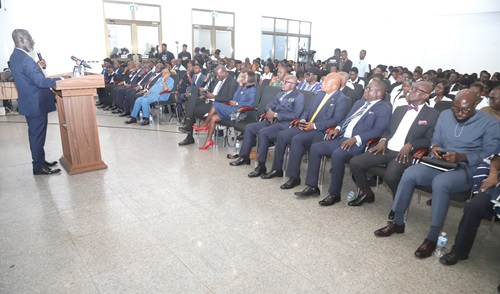
Lack of enforcement of ECOWAS Court decisions worrying — Justice Asante
The immediate past President of the ECOWAS Community Court of Justice (CCJ), Justice Edward Amoako Asante, has bemoaned the unwillingness of ECOWAS Member States to enforce decisions of the court.
He said the lack of political will by member states to enforce the decisions of the court, despite signing onto the ECOWAS protocols, which established the court, was not only negatively affecting the effectiveness of the court, but could also derail human rights in the sub-region.
Speaking during a public lecture at the University of Professional Studies, Accra (UPSA), Justice Asante said many ECOWAS member states had also failed to ratify the protocols establishing the CCJ to ensure that they became part of their national laws.
“As of 2024, only Burkina Faso, Liberia, Niger and Sierra Leone had ratified both the 1991 Protocol of the Court and the 2005 Supplementary Protocol that expanded the Court’s jurisdiction to include human rights.
“With the exit of Burkina Faso and Niger from the Community, only two of the remaining Member States have ratified both the 1991 and 2005 Protocols,” he said.
Such a situation, Justice Asante explained, had made it impossible for individuals who have won cases against their countries at the CCJ to resort to national courts to facilitate the enforcement of the judgments.
He gave an example of a case of a Nigerian businessman, Chude Mba, who won a judgment against the government of Ghana at the CCJ, but the judgment could not be enforced.
“After unsuccessful attempts at getting the Government of Ghana to recognise and pay the compensation that was awarded him, he filed an application in the High Court of Ghana for the enforcement of the judgment.
“Unfortunately, the High Court dismissed the application for reasons including the fact that Ghana has not ratified and domesticated Protocols of the ECOWAS Court to enable Ghanaian courts to enforce judgments of the ECOWAS Court,” he said.
The public lecture, organised by the UPSA Law School, was on the theme: “Building a community Court of Justice that works for citizens: Some reflections.”
It was attended by the Minister of Foreign Affairs, Samuel Okudzeto Ablakwa; legal luminary, Nana Dr S.K.B. Asante, and some current and retired justices of the Supreme Court, including Justices William Atuguba, Henry Anthony Kwofi and Richard Adjei Frimpong.
The CCJ has the mandate to interpret the ECOWAS Treaty and protocols, as well as resolve disputes between member states or member states and institutions of ECOWAS in relation to the application of the treaty and protocols.
The jurisdiction of the court was expanded in 2005 to include hearing of alleged human rights violations by member states against their citizens, with individuals having the capacity to file cases before the court.
Enforcement procedure
Explaining the enforcement process of the decisions of the CCJ, Justice Asante further said Article 24 of the court’s protocol established self-enforcement mechanisms where member countries were supposed to appoint a competent national authority to verify and take steps to enforce the decisions of the court.
However, he said, most member states had designated their Attorney-Generals (A-Gs) as the national authority to enforce the decisions, which he said was problematic because the A-Gs were the defendants in the cases which resulted in the judgments.
The ECOWAS protocols, he added, gave no power to the CCJ to ensure the enforcement of its judgment, further making it difficult for the decisions of the court to have significant impacts.
Justice Asante, however, praised countries such as Nigeria and The Gambia, whose compliance level had increased.
“Nigeria is gradually complying. When the new President of the Gambia came into office, there were many decisions against the country, but the President enforced the judgment, paid the compensations involved and also notified the court,” Justice Asante added.
Consideration
For his part, Mr Ablakwa said the government would look at the enforcement issue since compliance would enhance regional integration and expand the frontiers of human rights in the ECOWAS sub-region.
Writer’s email:
